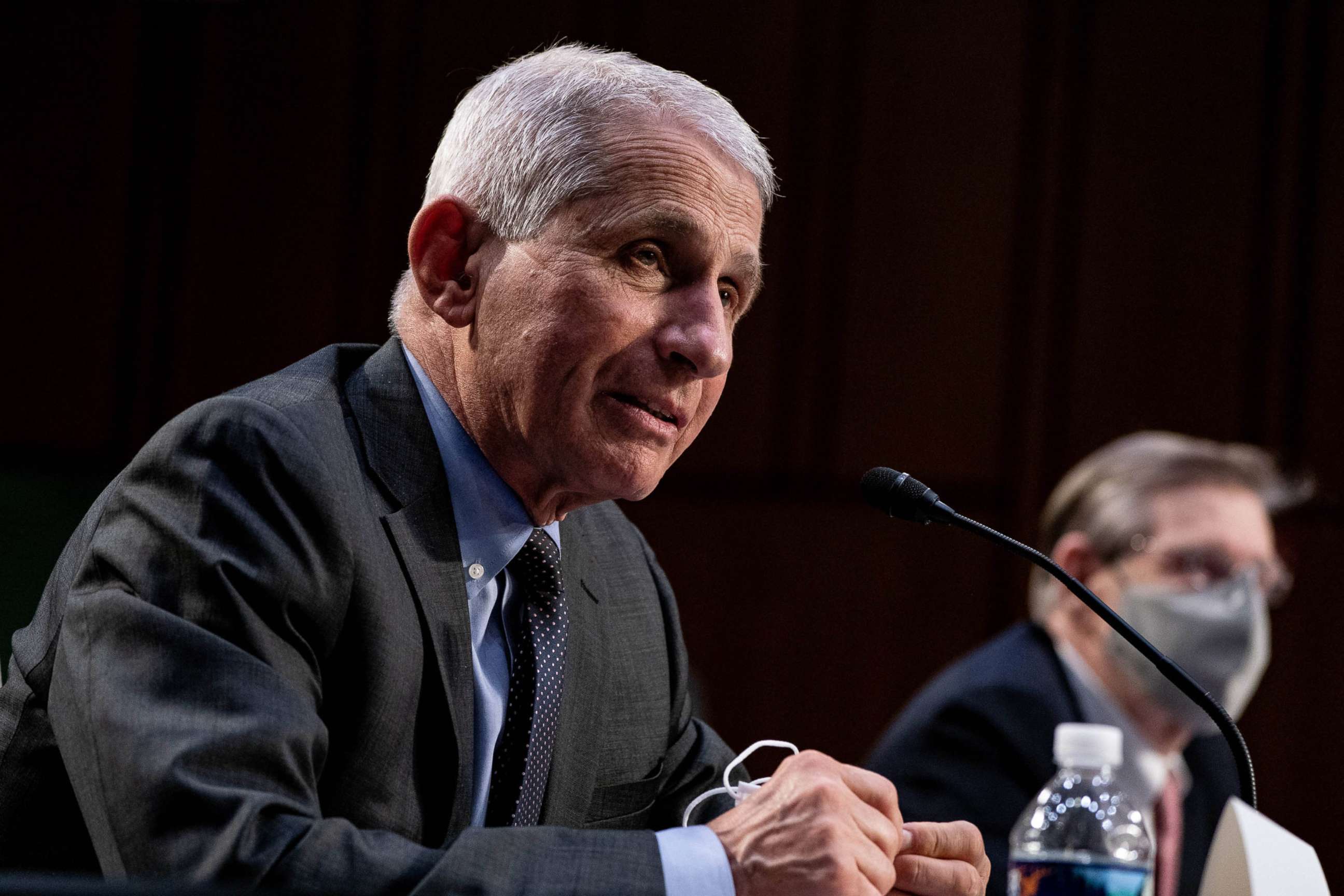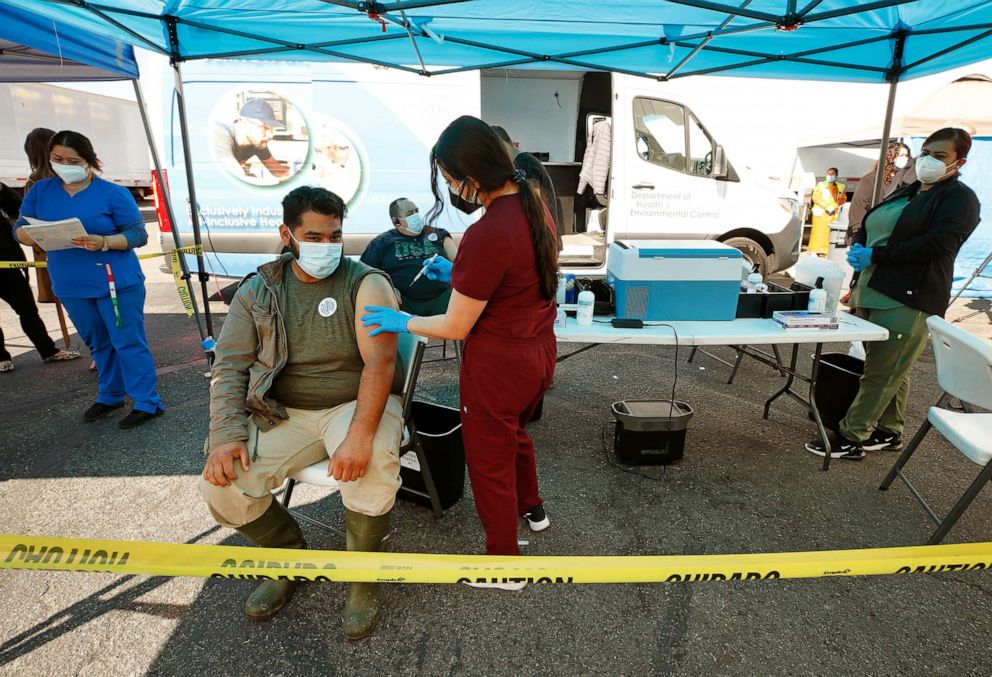Fauci warns possible 4th surge in COVID-19 cases could undermine progress
Dr. Anthony Fauci said Thursday he's concerned about a possible fourth surge in COVID-19 cases as numbers tick up in some states and Europe, which the U.S. has traditionally trailed by about four weeks in its COVID trajectory.
Fauci, the nation's chief disease expert, and other Biden administration officials testified before the Senate's Health committee on Thursday about the COVID response, stressing the U.S. is in a race against virus variants to vaccinate Americans as quickly as possible.
Fauci said the situation in the U.S. has improved greatly since the intense spike in cases after the winter holidays, but that he still worries the country will "declare victory" over the virus too soon and relax behaviors that could lead to another surge in the number of cases.
"I’m concerned that if we pull back in our enthusiasm for the fact that vaccines are rolling out, and things look good, if we pull back prematurely, we may trigger another surge. And that would really set us back in all the things that we’re trying to do," he told lawmakers.

Although the U.S. national daily case average continues to fall -- about 32.5% over the last month -- nearly a third of all states have recently seen their average number of cases rise by at least 10%.
Fauci said trends in Europe's number of cases have been a good predictor of trends in the U.S. and should serve as a warning about the importance of staying vigilant about stopping the virus from spreading.
Over the past few weeks, cases have spiked in Poland, France and Italy, provoking increased restrictions, hospitals nearing capacity and school closures.
"Europe is generally about three to four weeks ahead of us in the dynamics of their outbreak. And what they saw a little while ago was a plateauing of their decrement. They were coming down nicely, and then they plateaued. And then, just as you might have predicted, they then, one, started to go up," he said.
Vaccination rates in Europe have been lower than in the U.S., though, where about 22% of people have received their first dose and about 12% of people have been fully vaccinated, according to the CDC. Still, that leaves a vast majority of the country unprotected from the virus, and variants from the U.K., New York City and California are spreading.

Public health experts like Fauci and CDC Director Rochelle Walensky have said that even as many states relax restrictions on things like indoor dining or allow outdoor sporting venues to reopen, Americans still need to be cautious and continue steps like wearing masks and avoiding large gatherings.
"The combination of rapid reopening, increasing mobility and spread of new COVID variants is likely driving the upward trend in cases in many parts of the country," said Dr. John Brownstein, chief innovation officer at Boston Children's Hospital and an ABC News contributor. "While we should feel optimistic with the vaccine rollout, the new surge, even if short-lived, will likely result in avoidable hospitalizations and deaths."
The CDC has said that fully vaccinated individuals can gather with other fully vaccinated individuals without masks but that everyone should continue to wear masks around people at high risk for severe COVID-19 or in groups of unvaccinated people from multiple households.
That guidance has faced some pushback from people who argue it is safe for vaccinated individuals to travel and that Americans should be allowed to do more as an incentive to get the vaccine, but Fauci and Walensky have said that until more of the population is vaccinated, increasing travel or relaxing mask wearing could still spread new variants of the virus.
Fauci forcefully pushed back on criticism from Sen. Rand Paul that the administration is pushing for people to wear masks unnecessarily, saying that because more unknown variants are spreading in the U.S., masks can prevent the virus from spreading even if people have been vaccinated or already contracted COVID-19.
"We're not dealing with a static situation of the same virus," Fauci said.
Public health experts like Georges Benjamin, executive director of the American Public Health Association, are urging Americans to stay cautious during the spring months as more people start to travel, which the CDC still recommends against.
"Despite so much good news about the speed of vaccination efforts, it’s important to recognize that COVID-19 is still a very real threat. Fully vaccinated adults remain in the minority, and the number of those infected remains far too high to let our collective guard down. To be blunt, we are far from putting this virus behind us," he said in a statement.
David Kessler, the former FDA chief Biden tapped to lead the vaccine efforts, said the administration is working to help people understand that the COVID-19 vaccines are safe and that getting vaccinated can help end the pandemic, which he said would be the country's greatest challenge in the short term.
"I think we're going to have to make sure that people understand how important beyond vaccinated is and how -- what the safety profile is. I wasn’t convinced when I started, but I am convinced now, that as Dr. Fauci said, we are in a race against these variants," he testified.
"And the most important thing we can do currently is all as citizens is to step up, not for us, but for our families and for our fellow citizens to become vaccinated."




